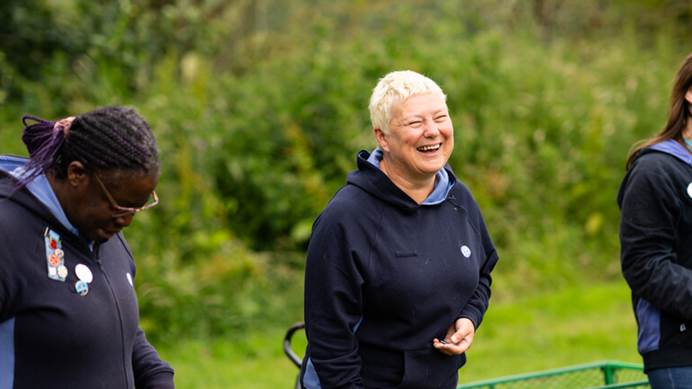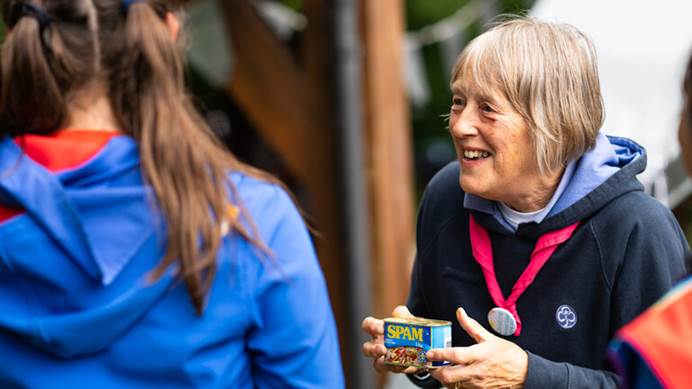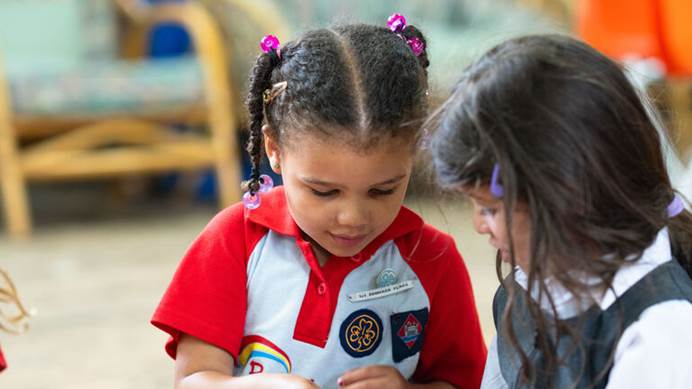Managing concerns about adult volunteers procedure
How to apply the managing concerns about adult volunteers policy
Last reviewed: September 2023
Find out what changed and why in our most recent updates to this procedure.
This procedure should be read alongside our complaints and investigation procedures.
This handy flowchart will help you to understand how the process works.
Where possible we’ll resolve concerns through an informal resolution, particularly if the concern doesn’t involve a breach of our policies or procedures.
Informal resolutions
How do we decide when an informal resolution is appropriate?
When someone first reports a concern to HQ or a country or region, an appropriate member of staff or volunteer will decide what the best way forward is and whether the issue can be resolved informally. Please note that all safeguarding concerns must be reported to the HQ safeguarding team, even if they are low-level, so the team can advise what to do.
What happens next?
Where it’s decided that an informal resolution is the best way forward, we’ll pass the concern on to a senior volunteer, like a commissioner, who will give advice on next steps. The concern can later be investigated formally if necessary.
If an issue is resolved informally the senior volunteer looking into the concern doesn’t need to write an investigation report. But they must still speak to all parties and send a written notice confirming the concern has been resolved. The senior volunteer may also share a copy of any relevant meeting notes with those involved, if appropriate. If the concern was originally reported to HQ, the senior volunteer must send a copy of the written notice detailing the informal resolution to the relevant safe practice team.
Formal resolutions
If an informal resolution is not appropriate or has failed to resolve the concern, a formal resolution should be used.
Support and training outcomes
Following a formal investigation it may be decided that a volunteer would benefit from further support and training. In these cases an improvement plan or formal advice will be used.
What do we mean by an improvement plan?
An improvement plan is a set of actions to address areas identified for improvement. This could include retraining, having unit meetings observed, or being mentored. It must be completed in partnership with the volunteer. If any details will be shared with other volunteers, for example about mentoring or supervision, this must be agreed as part of the plan.
All improvement plans must include:
- A clear list of specific and achievable actions, and how this will be measured.
- Dates for actions to be completed by.
- An explanation of what will happen if the actions aren’t completed as and when required. For example, a restriction will remain in place until all actions on the improvement plan are completed.
- Dates to review the improvement plan and the volunteer’s progress. And who will do this.
- Details of any support which might be required.
When is an improvement plan issued?
Improvement plans are used when volunteers need to make specific improvements. They may be issued at the same time as formal advice or a restriction.
Reviewing an improvement plan
Girlguiding will inform the volunteer of their right to appeal an improvement plan, in accordance with our appeals and review procedure.
The commissioner must keep track of the volunteer’s progress in completing the improvement plan in line with any timetable or deadlines. The commissioner must confirm in writing to the volunteer when they’ve completed the plan to a satisfactory standard.
Once the volunteer has completed the improvement plan, the commissioner must contact the relevant HQ team so that it can be reviewed and removed from the volunteer’s GO record.
If the volunteer doesn’t complete the improvement plan as and when required the commissioner may, in discussion with the relevant HQ team, either:
- Consider changes to the improvement plan with the volunteer.
- Issue sanctions if we believe the volunteer isn’t making progress or cooperating.
What do we mean by formal advice?
Formal advice is a written record of any learning or guidance that a volunteer must follow. Generally, these learnings are identified from the findings of an investigation.
Commissioners sending formal advice letters must use this template. The letter must outline the concern, reasons for it and the conditions the volunteer must follow. For example, making a written apology or agreeing to an improvement plan and timeframe for this.
The formal advice letter may include:
- A record of the history of previous failures to meet our expectations and any action taken.
- An explanation that further failures to meet our expectations may lead to sanctions. For example, suspension or withdrawal.
When do we use formal advice?
Formal advice is used when a volunteer has breached a policy or procedure, and learning has been taken.
For example:
- A data protection breach.
- Inappropriate communication with volunteers, parents or carers.
- Low level concerns.
Reviewing formal advice
Girlguiding will inform the volunteer of their right to appeal a formal advice letter, in accordance with our appeals and review procedure.
The commissioner must keep track of any requirements laid out in the formal advice letter to make sure they’re completed in line with the timetable or deadlines set.
A record of the formal advice letter will remain on the volunteer’s GO record for at least a year. After this the volunteer can request a review from their commissioner.
The decision on whether this record should be removed will depend on whether the concern has been fully resolved, and if the conditions have been followed.
The commissioner must contact the relevant HQ team for the formal advice record to be reviewed and removed from the volunteer’s GO record.
The decision to use an improvement plan or formal advice is made together with the county commissioner and/or the country or region chief commissioner and this process should be followed:
- The HQ team and relevant commissioner decides what action is to be taken. The chief commissioner will be told in advance.
- The HQ team asks the local commissioner to inform the volunteer.
- The commissioner informs the volunteer, what this means and why it's being placed on their role(s). This should be done verbally, preferably in person. If attempts to contact the volunteer receive no response, the commissioner should discuss next steps with the relevant HQ team as soon as possible.
- Once the commissioner has informed the volunteer, a letter will be sent to them outlining all relevant details. The letter is usually sent by the commissioner, who will share the letter with HQ.
- The HQ team logs the details on the volunteer’s GO record. Other volunteers won’t be able to see any information about any action taken.
If appropriate, the relevant HQ team will advise the commissioner to share relevant details with other parties, such as other volunteers, parents and carers. Depending on the case, some information may have to be kept confidential. The HQ team will confirm what can and can’t be shared.
Sanctions
If an improvement plan or formal advice isn’t appropriate, we may need to take further action against a volunteer’s role under our managing concerns about adult volunteers policy.
This section of the procedure is to help commissioners understand how and when sanctions are used, and their role in the sanctions process. Sanctions are used by our HQ safeguarding team and our HQ complaints and compliance team, in partnership with country or region chief commissioners and county commissioners. Sanctions include suspensions, restrictions and withdrawals.
If you’re a volunteer who has had their role suspended, restricted or withdrawn this procedure will help you understand the process we follow when reaching this decision. If you’ve previously had your role suspended or restricted and wish to have this decision reviewed contact the relevant HQ team to discuss this. Volunteers who’ve had their role(s) withdrawn should read the information about withdrawals below.
Information about investigations and sanctions must be handled sensitively and in line with our managing information policy. Other volunteers will only be told about sanctions if they need to know as part of their role.
When are sanctions used?
We use sanctions to resolve a concern about a volunteer’s conduct, and manage any associated risks. Depending on the concern, we may do this:
- If there’s information on a volunteer’s disclosure certificate. Find out more in our recruitment and vetting procedure.
- Before, during or after an investigation into a safeguarding allegation, concern or disclosure. Find out more in our safeguarding procedure.
- On the advice of a statutory agency, who may or may not be carrying out an investigation.
- Before, during or after an investigation into a serious breach of a policy or Girlguiding’s expectations.
If an internal investigation is needed, this will be carried out in line with our investigation procedure. The investigation procedure doesn’t apply if a statutory agency, like the police or children’s services, is investigating safeguarding or any other concerns.
GO will send an automated update to the relevant HQ team if a volunteer with a sanction:
- Changes roles.
- Signs up to an event through GO.
- Reapplies to volunteer after leaving Girlguiding.
If the team needs more information, we may contact the county commissioner or sanctioned volunteer.
What happens if a volunteer resigns?
Volunteers can resign from Girlguiding by letting their commissioner know. They can do this verbally or in writing. The commissioner will respond in writing.
If an investigation is needed, this may still take place or continue after the volunteer has resigned. If the volunteer won’t cooperate with the investigation, they may be withdrawn even if they’ve already resigned.
What is the process for issuing a sanction?
Sanctions are issued by our HQ safeguarding team or our HQ complaints and compliance team. The decision to add a sanction to a volunteer’s role(s) is made together with the county commissioner and/or the country or region chief commissioner.
- The HQ team and relevant commissioner decides if a sanction is necessary. This may be before, during or after an investigation, or on the advice of a statutory agency. If urgent action is required, a suspension may be put in place before the chief commissioner has approved this. All other sanctions will be approved by the chief commissioner in advance.
- The HQ team asks the local commissioner to inform the volunteer.
- The commissioner informs the volunteer of the sanction, what this means and why it is being placed on their role(s). This should be done verbally, preferably in person. If attempts to contact the volunteer receive no response, the commissioner should discuss next steps with the relevant HQ team as soon as possible.
- Once the commissioner has informed the volunteer, a letter will be sent to them outlining all relevant details. The letter will be sent by HQ.
- The HQ team logs the details on the volunteer’s GO record. Other volunteers won’t be able to see that the volunteer has received a sanction.
If appropriate, the relevant HQ team will advise the commissioner to share relevant details with other parties, such as other volunteers, parents and carers. Depending on the case, some information may have to be kept confidential. The HQ team will confirm what can and can’t be shared.
This process doesn’t apply when a volunteer is:
- Restricted due to information on their disclosure certificate. Our recruitment and vetting procedure explains the process for this.
- Restricted or withdrawn because their safer guiding training hasn’t been renewed. See here for information on this process.
- Withdrawn because they haven’t started their disclosure check. See here for information on this process.
What do we mean by suspension?
A suspension from Girlguiding is a temporary measure. It’s a neutral act to protect a volunteer under investigation, the organisation, and our members.
If a volunteer is suspended, this means they’re still an active member of Girlguiding but they aren’t allowed to carry out their volunteering role.
For example, they mustn’t:
- Attend any meetings or events run by Girlguiding, including social events
- Make contact with any young members, volunteers or parents and carers about Girlguiding activities
- Use social media to promote, advocate or take part in Girlguiding activities
The relevant HQ team will send the suspended volunteer a letter explaining this, and any other conditions of the suspension. These must be followed until the HQ team says otherwise. If the volunteer doesn’t follow these conditions, they may be withdrawn immediately.
A suspended volunteer won’t be able to access information about other volunteers or young members on GO.
When is a suspension issued?
Suspensions are issued following an alleged failure to meet Girlguiding’s expectations, which we consider to be serious.
We use suspensions:
- To allow an objective investigation to take place, and protect the volunteer during the investigation.
- To mitigate risk if there is a concern that young members or adults are in danger or at risk of harm.
- To mitigate risk if there is a risk of harm to the reputation of Girlguiding.
We may issue a suspension as soon as an investigation begins, or during the course of an investigation when the country or region chief commissioner and relevant HQ team consider it necessary. Once the decision to place a suspension has been approved by the country or region chief, the volunteer must be informed and the suspension put in place within 48 hours, or before the next unit meeting or event, whichever is sooner. If urgent action is required, a suspension may be put in place before the chief commissioner has approved this.
Reviewing a suspension
A suspension is a temporary measure. This means it can’t be appealed. Suspensions are reviewed following the outcome of an investigation. The investigation may result in no further action being taken, or a different sanction being put in place.
The volunteer should receive an update about the situation from their commissioner at least every 2 months. The relevant HQ team and commissioner should formally review the suspension every 4 months, and provide an explanation for why it remains in place. Updates can be in writing, by letter or email, or during a face to face meeting.
The suspended volunteer should be given the opportunity to present information about any change in circumstances which might affect the outcome of the investigation.
What do we mean by a restriction?
A restriction is a limit placed on a volunteer which means they aren’t allowed to take on certain roles or responsibilities.
For example:
- Changing role, such as from leader to unit helper.
- Not being allowed to run international trips.
- Not working directly with young members.
- Only taking on an admin role.
- Not dealing with finances.
- Not driving young members.
When is a restriction issued?
We may issue a restriction:
- Before or during an investigation carried out by our HQ safeguarding or complaints and compliance team, when a suspension isn’t necessary.
- Following the outcome of an internal investigation.
- On advice of a statutory agency, who may or may not be carrying out an investigation.
- If the volunteer acknowledges they haven’t met our expectations.
- Where Girlguiding reasonably believes it is necessary as a result of the volunteer’s circumstances. For example, bankruptcy or a recent driving or criminal offence.
Reviewing a restriction
Girlguiding will inform the volunteer of their right to appeal a restriction, in accordance with our appeals and review procedure.
The volunteer can ask their commissioner to review a restriction after three years from the date the restriction was put in place, or after a relevant and significant change in circumstances. The commissioner must contact the relevant HQ team, who will advise and support on the review process. This may include risk assessments, support plans or reviewing other relevant information.
What do we mean by withdrawal?
If we withdraw someone from Girlguiding it means they’re no longer allowed to volunteer with us. This means they can’t attend any Girlguiding events or activities in the role of a volunteer.
When are withdrawals issued?
A volunteer may be withdrawn if:
- There has been a serious breach of our expectations.
- The volunteer hasn’t followed other sanctions.
The withdrawal will take place after an investigation is carried out internally in line with our investigation procedure, or externally by a statutory agency.
Under some circumstances, Girlguiding has a legal duty to make a referral to the Disclosure and Barring Service (DBS), Access NI or Disclosure Scotland if we withdraw someone’s membership. If we do this, our HQ safeguarding team or complaints and compliance team will let the volunteer know.
Appealing a withdrawal
Girlguiding will inform the volunteer of their right to appeal their withdrawal, in line with our appeals and review procedure.
A volunteer who has been withdrawn from Girlguiding may reapply under the following circumstances:
- Three years have passed from the date of their withdrawal.
- There has been a relevant, significant change in circumstances since the date the withdrawal took place.
Any volunteer wishing to reapply should contact the relevant HQ team to discuss this.
What support do we give sanctioned volunteers and those being investigated?
It can be distressing for a volunteer to receive a sanction. That’s one of the reasons we ask commissioners to try to have a face to face meeting or at least a telephone call with the volunteer to tell them about a sanction. You can find guidance about approaching sensitive conversations here.
The volunteer may have questions about what the sanction means and what happens next. The commissioner should let them know who they can contact at HQ and refer them to this policy and procedure.
Be mindful of how distressing this may be for a volunteer. For example, a suspended volunteer can’t attend Girlguiding events or meetings which may result in isolation from their social network.
Volunteers who are concerned about their physical or mental health should seek support from their GP. The relevant HQ team can provide additional support and signposting.
If the volunteer is being investigated and it’s appropriate, the relevant HQ team or the country or region will offer the volunteer the option of support from a safe practice liaison volunteer within 7 working days of telling them about the investigation. The safe practice liaison volunteer’s role is to offer emotional support during the investigation, acting as a sounding board and going to meetings with the person when needed.
If at any point the investigator or safe practice liaison volunteer feel the volunteer under investigation would benefit from more support, they should contact the relevant HQ team or signpost the volunteer to appropriate support organisations.
Any volunteer whose role has been suspended or withdrawn will be offered access to external, confidential and free wellbeing support by the relevant HQ team.




